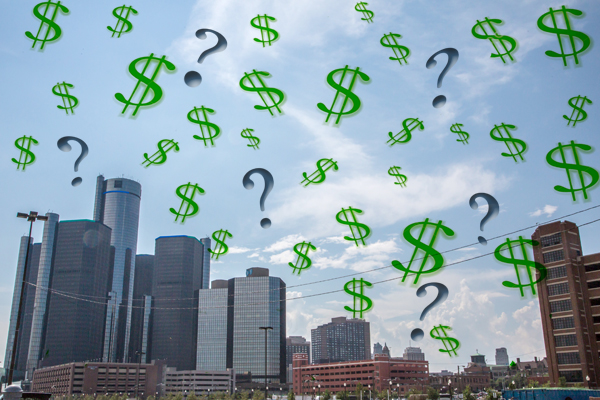It’s good to be the king bank

Graphic/photo by Anne C. Savage | Eclectablog
There are two big questions swirling around Detroit’s bankruptcy, questions that will ultimately be decided by federal bankruptcy judge Steven Rhodes. The first is whether or not the public employee pension funds are actually underfunded by billions of dollars. Are they? As it turns out, it depends who you ask.
Recently, Morningstar, an major investment firm, suggested that the funds are actually in fine shape. This is based on an assumed rate of return of 8%. This puts the pensions at around 91% funded.
However, Detroit Emergency Manager Kevyn Orr says that 7% is more realistic. Under that assumed rate of return, the funds are actually underfunded by around $3.5 billion.
As it turns out, reasonable people can disagree on which is the better number to use. As the Detroit Free Press recently showed, some pensions are returning close to 8% while others don’t even return 7%.
Kevyn Orr is being conservative which is understandable. However, when you are basing the eligibility of the city for bankruptcy, you need to also be realistic. That’s likely where Judge Rhodes will need to weigh in.
Another big question is who gets paid first once the bankruptcy begins to unwind. There are two types of debt that are held by Detroit creditors: “limited” general obligation” bonds and “unlimited” general obligation bonds.
Unlimited-tax obligation bonds are those which are voter-approved (Detroiters voted to take on the debt by issuing the bonds.) The groups that hold those bonds say they should get paid back 100% and everyone else gets to squabble over what is left. Kevyn Orr took the unprecedented step of saying both types of debt were unsecured and would be treated the same. This has the unlimited-tax bond holders in a tizzy.
Assured Guaranty, which backs $146 million of the unlimited tax debt, probably will fight over its secured status…“We believe the city’s pledge of its unlimited taxing power and resources is not, legally or morally, on the same level of priority as unsecured obligations to vendors and other creditors,” Dominic Frederico, Assured’s chief executive officer, said during an Aug. 10 conference call with investors.
Decisions on these two things will determine if Detroit is even eligible for bankruptcy, something that Judge Rhodes will decide in the next few months and, if it is, who gets their debt paid back first. If unlimited-tax debt is paid back 100%, it will leave a much, much smaller pool of money for other debt holders to split up.



